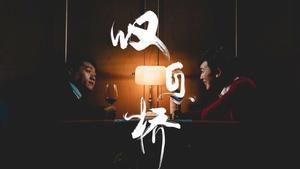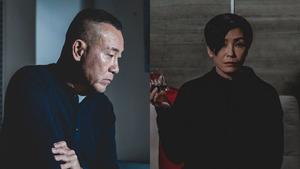Interlinked stories, different interpretations of the same event and lingering shots give an authentic touch to groundbreaking series, Wang Kaihao reports.
 Hong Kong TV drama The Gutter highlights urban romance and the complexity of human nature by using Rashomon style as its approach. (PHOTO PROVIDED TO CHINA DAILY)
Hong Kong TV drama The Gutter highlights urban romance and the complexity of human nature by using Rashomon style as its approach. (PHOTO PROVIDED TO CHINA DAILY)
Its television dramas seem to reflect its dynamism. Hong Kong TV is often characterized by brightly lit scenes and the fast-paced delivery of its actors, as if reflecting the pulse of the city. In so many ways "lights, camera, action" sums up Hong Kong TV.
But, going against this tide of success is The Gutter, which may see viewers reappraising their opinions.
With a cold tone, a slow pace, myriad long shots, and scrupulous arrangement of picture compositions and shadows, this "authentic" TV drama is bucking the trend in what seems like a successful way.
Piloting on March 28 through China's major online streaming media platform Youku, the 15-episode production scored 8.8 points out of a total 10 on Douban, the country's key online TV and film review platform.
This urban romance, co-produced by Youku and Hong Kong-based ViuTV, not only became the highest-rated Chinese-language drama series this year so far, but also ranked as one of the highest-acclaimed Hong Kong series on the platform.
Three main storylines are interwoven. Two roommates, Thomas and Sammy, have known each other for years, but they are reluctant to articulate their affection toward each other. Both Ken and Joyce, a couple finally getting married after dating for eight years, have their own secrets. And Catherine and Ryan, a long-separated couple, struggle to rediscover the meaning of family.
It deploys a Rashomon style in its approach. This allows characters to view and rationalize the same scenario in an often self-serving manner.
"Different people will see either the head or the tail of the same story," says Twofive Yeung, one of the two directors of The Gutter, in a recent phone interview with China Daily. The other director is known as Fatball. "Traditional plays often tell the story through personal perspectives, and we want to borrow that to show the complexity of people."
The Gutter-its Chinese title being Tanxi Qiao (meaning "the bridge of sighs")-delivers the sullen essence of a story, rather than a happy ending. Many scenes are set in winter, creating an even colder aura.
"It can be too real or too straightforward sometimes, but it actually inspires people to reflect on their own life," Yeung says.
"If you grip something too tightly, it will hurt. Sometimes it's better to take it easy. I'm not only talking about love, but everything," he adds.
Relationships between parents and children also come into play.
The directing duo, Yeung and Fatball, first entered the business by shooting advertisements. In 2016, they cooperated to present their first romance series Margaret & David: Green Bean, which was widely acclaimed.
"When shooting ads, we have to tell a story within 30 seconds," Fatball says. "Every frame of picture has to be informative and interesting enough, and we use that skill in The Gutter.
"We don't want to repeat ourselves, but one thing is repeatable: to tell stories of human nature, be it a comedy or a horror. They're just expressed in different ways."
Yeung says there is another thing that will remain unchanged-the production team working well.
 Bowie Lam (left) acts as Thomas in the series. Christine Ng acts as Catherine. (PHOTO PROVIDED TO CHINA DAILY)
Bowie Lam (left) acts as Thomas in the series. Christine Ng acts as Catherine. (PHOTO PROVIDED TO CHINA DAILY)
Norris Wong, screenplay of Margaret & David: Green Bean, joined the duo again to write the story of The Gutter.
"We don't want the story to be overwhelmingly 'dramatic', but to simply reveal family ethics," Wong says. She had concerns about the drama due to its unique format, so its success turned out to be "a surprise".
"I often read reviews on Douban, and I've found that viewers are really careful about details," she adds.
Details are vital. For example, as the plot unfolds, memories of different characters differ not just about events but also on items of clothing. That also makes watching the series seem, at times, like a spot-the-difference competition.
Despite the creative approach, Wong admits that they used some well-known plot devices, which may run the risk of being "cliches" but may make characters feel emotionally approachable.
"We still have someone falling ill in the series, some eavesdropping, some misunderstandings, and many story devices that get used in other TV series, but the recipe is not the same," Wong says.
For fans growing up in the 1980s and '90s, watching Hong Kong classics, many still find an outlet for their nostalgia. Veterans like Paul Chun, 75, and Lau Siu-ming, 89, have also joined the cast, as did some stars who experienced the "golden age" of Hong Kong dramas with local television broadcaster TVB.
Bowie Lam, 55, who plays Thomas, also a producer of The Gutter, said in a previous group interview when the series was launched: "Telling a good story matters… We haven't thought too much about the tastes of those people who grew up watching TVB-style productions. I don't say they were not good, but it's time to embrace the future."
Both directors mention that cooperating with online platforms from the Chinese mainland, like Youku, will provide more opportunity for Hong Kong scripts to be turned into productions.
"Online platforms bring us a larger space to create more varied content," Yeung says. "We have all kinds of possibilities in the big market."
And a wider horizon is probably what the directors have given to The Gutter.
Despite being inspired by the shared popularity of the series on the Chinese mainland and in Hong Kong, Yeung says he does not cater to any single market, but explores common emotions that can travel around the world.
"Hong Kong is a very small place, but we want all people to be able to relate to the stories. We seldom create stories that feel 'local', and all our stories will eventually be about inner worlds," Yeung says.
Wong believes the art-house approach of The Gutter may provide a possibility for other directors to try new ideas instead of sticking to tried and tested but "safe" themes, such as those of police officers or lawyers.
The Gutter, successful as it is, may not represent a new page for Hong Kong drama, Fatball says. "But more can be achieved by Hong Kong directors if we are given more room for creativity," he adds.
Yeung agrees: "Someone has to take the first step. Even if it's a detour, it at least explores an unknown area. I will be happy if more people follow."
Contact the writer at wangkaihao@chinadaily.com.cn



